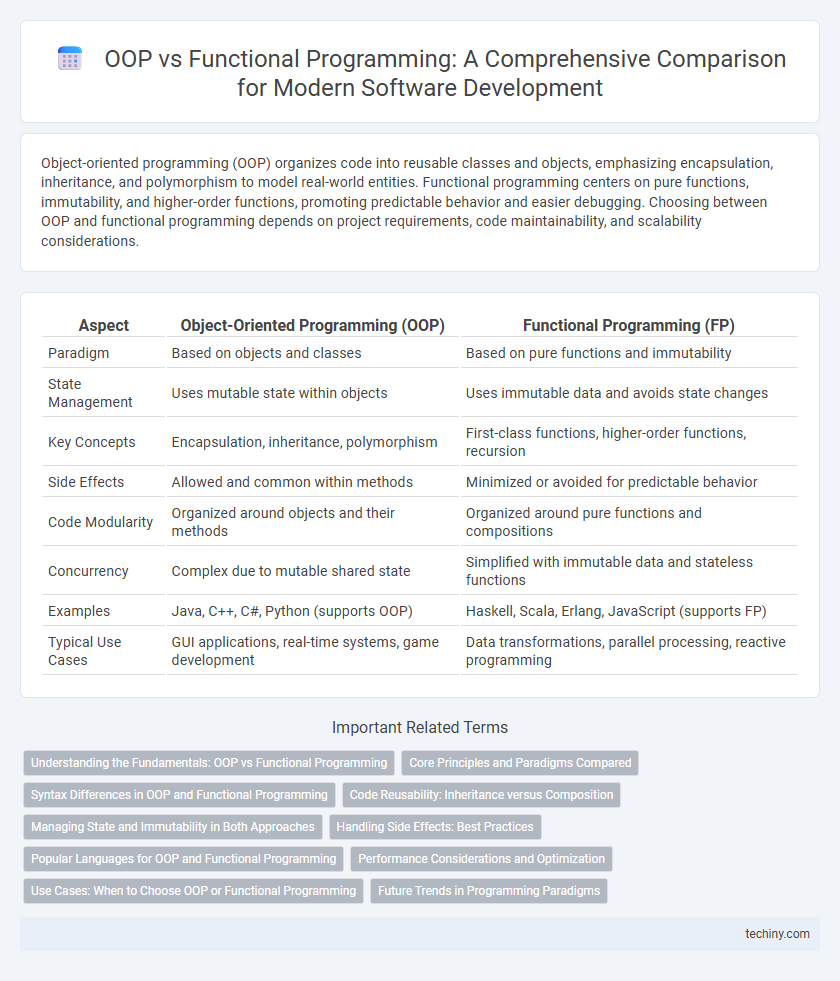Object-oriented programming (OOP) organizes code into reusable classes and objects, emphasizing encapsulation, inheritance, and polymorphism to model real-world entities. Functional programming centers on pure functions, immutability, and higher-order functions, promoting predictable behavior and easier debugging. Choosing between OOP and functional programming depends on project requirements, code maintainability, and scalability considerations.
Table of Comparison
| Aspect | Object-Oriented Programming (OOP) | Functional Programming (FP) |
|---|---|---|
| Paradigm | Based on objects and classes | Based on pure functions and immutability |
| State Management | Uses mutable state within objects | Uses immutable data and avoids state changes |
| Key Concepts | Encapsulation, inheritance, polymorphism | First-class functions, higher-order functions, recursion |
| Side Effects | Allowed and common within methods | Minimized or avoided for predictable behavior |
| Code Modularity | Organized around objects and their methods | Organized around pure functions and compositions |
| Concurrency | Complex due to mutable shared state | Simplified with immutable data and stateless functions |
| Examples | Java, C++, C#, Python (supports OOP) | Haskell, Scala, Erlang, JavaScript (supports FP) |
| Typical Use Cases | GUI applications, real-time systems, game development | Data transformations, parallel processing, reactive programming |
Understanding the Fundamentals: OOP vs Functional Programming
Object-Oriented Programming (OOP) centers on encapsulating data and behavior within objects, promoting modularity and reusable code through classes and inheritance. Functional Programming emphasizes immutability, pure functions, and declarative code, enhancing predictability and reducing side effects. Understanding these paradigms involves recognizing OOP's focus on stateful objects versus Functional Programming's emphasis on function composition and data transformation.
Core Principles and Paradigms Compared
Object-Oriented Programming (OOP) centers on encapsulating data and behavior within objects, leveraging inheritance, polymorphism, and abstraction to promote modular and reusable code. Functional Programming (FP) emphasizes immutability, first-class functions, and pure function composition, enabling predictable state management and easier concurrency. While OOP organizes code around objects and their interactions, FP advocates for stateless functions and declarative programming to minimize side effects.
Syntax Differences in OOP and Functional Programming
Object-oriented programming (OOP) syntax centers around defining classes and creating objects with encapsulated data and methods, using constructs like classes, inheritance, and methods. Functional programming syntax emphasizes pure functions, immutability, and higher-order functions, often utilizing expressions, recursion, and function compositions instead of mutable state and loops. The syntactical distinction lies in OOP's focus on stateful objects and method calls versus functional programming's reliance on declarative function usage and data transformations.
Code Reusability: Inheritance versus Composition
Code reusability in object-oriented programming (OOP) primarily relies on inheritance, enabling new classes to extend existing ones and inherit their properties and methods. Functional programming emphasizes composition by combining pure functions to create complex behaviors without shared state or side effects. While inheritance promotes code reuse through class hierarchies, composition offers greater flexibility and modularity, improving maintainability and reducing tight coupling in software design.
Managing State and Immutability in Both Approaches
Object-oriented programming (OOP) manages state through mutable objects and encapsulation, allowing state changes via methods within classes, which can lead to side effects if not carefully controlled. Functional programming emphasizes immutability and pure functions, avoiding state changes by returning new data structures instead of modifying existing ones, enhancing predictability and facilitating easier debugging. Managing state with immutability in functional paradigms reduces shared state issues common in OOP, particularly in concurrent or parallel programming environments.
Handling Side Effects: Best Practices
Handling side effects in software development requires distinct approaches in OOP and functional programming; OOP typically manages side effects through encapsulation within objects, using methods to control state changes safely. Functional programming emphasizes immutable data and pure functions, minimizing side effects by isolating them in controlled, predictable constructs like monads or effect handlers. Best practices involve isolating side effects from core logic, ensuring maintainability and testability by separating stateful operations from pure computations.
Popular Languages for OOP and Functional Programming
Java, C++, and Python are among the most popular languages for object-oriented programming, emphasizing concepts like classes, inheritance, and encapsulation. Functional programming languages such as Haskell, Scala, and Erlang prioritize immutability, first-class functions, and pure functions to enable declarative coding styles. Modern development often blends both paradigms, with languages like JavaScript and Kotlin supporting OOP and functional programming features to improve flexibility and maintainability.
Performance Considerations and Optimization
Object-oriented programming (OOP) often incurs performance overhead due to abstraction layers like inheritance and dynamic dispatch, which can lead to slower execution compared to functional programming's emphasis on pure functions and immutability. Functional programming optimizes performance through lazy evaluation, higher-order functions, and reduced side effects, enabling better compiler optimizations and easier parallelization. Profiling tools and benchmarking are essential to identify bottlenecks and apply domain-specific optimizations for both paradigms in real-world applications.
Use Cases: When to Choose OOP or Functional Programming
Object-Oriented Programming (OOP) excels in scenarios requiring complex state management and modeling real-world entities, such as in GUI applications, game development, and enterprise software with extensive business logic. Functional Programming is preferable for tasks involving data transformation, concurrency, and stateless operations, making it ideal for big data processing, real-time analytics, and distributed systems. Selecting OOP or Functional Programming depends on the project requirements, code maintainability, and scalability considerations.
Future Trends in Programming Paradigms
Future trends in programming paradigms indicate a convergence between Object-Oriented Programming (OOP) and Functional Programming (FP) principles, emphasizing immutability, modularity, and scalability. Increasing adoption of hybrid languages like Scala and Kotlin demonstrate this shift by integrating FP features into traditional OOP frameworks to enhance code maintainability and concurrency. Advances in distributed computing and multicore processors further accelerate the preference for functional techniques to optimize performance and reliability in large-scale software development.
OOP vs Functional Programming Infographic

 techiny.com
techiny.com